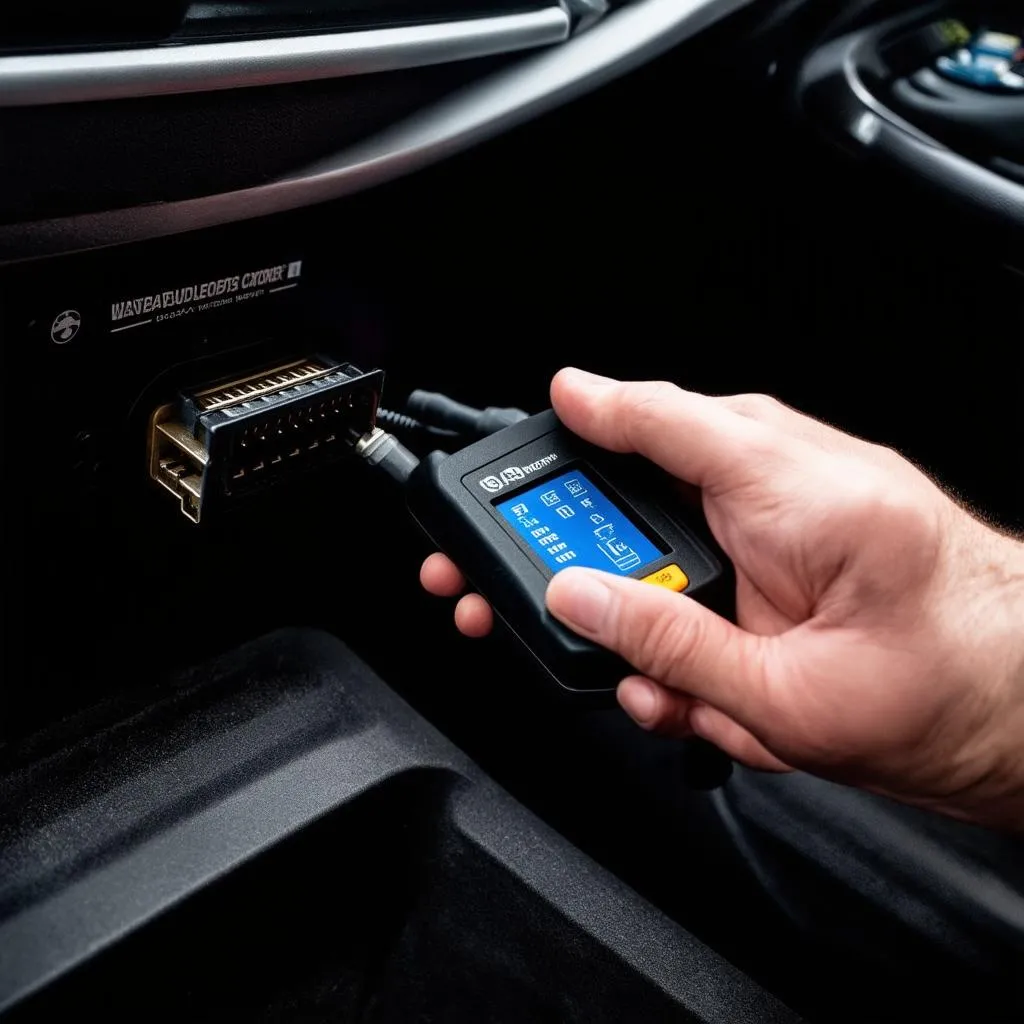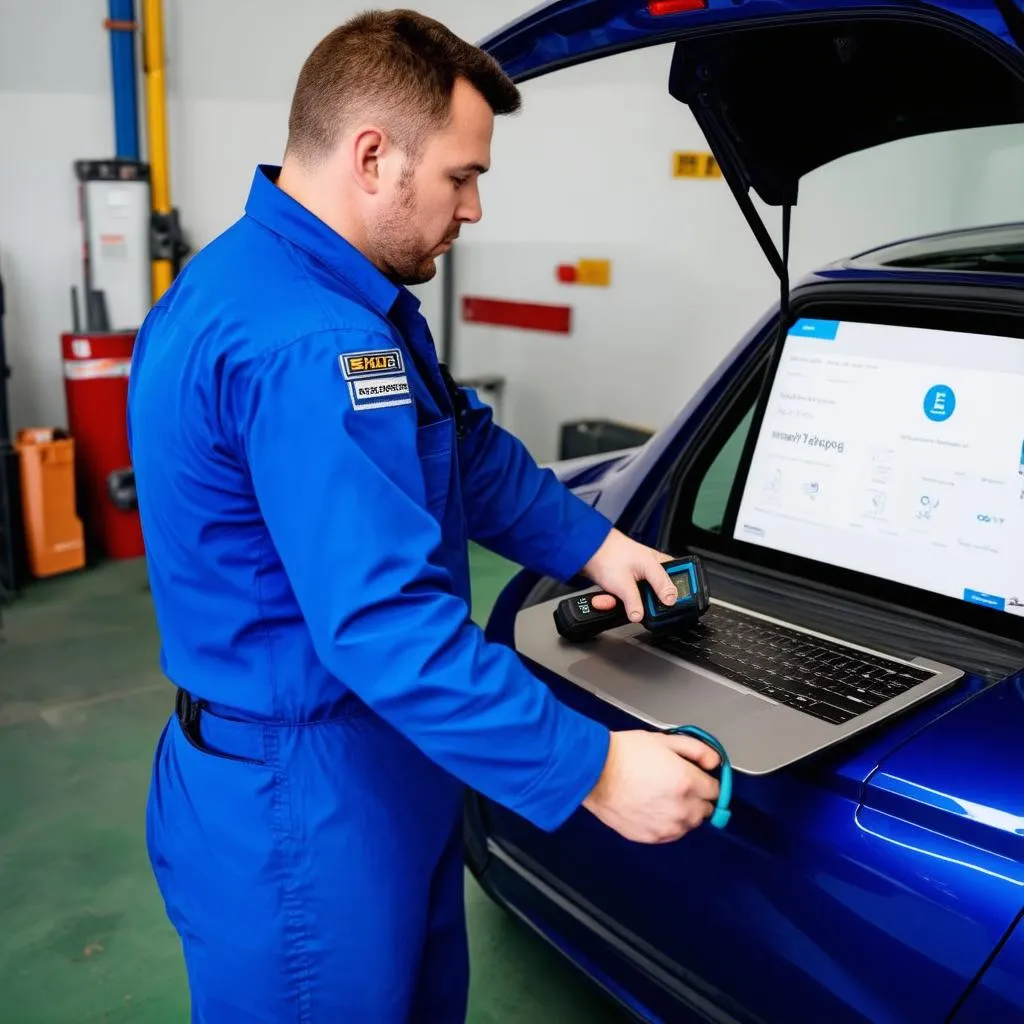“Having a car is like having a pet dragon,” my grandpa used to say, a mischievous glint in his eye. “Sometimes, it just needs a little TLC to roar back to life.” He wasn’t wrong. Just like a doctor uses a stethoscope, we use OBD scanners to understand what our cars are trying to tell us. But what happens when your OBD scanner decides to play mute? Frustrating, right? If you’re staring at an “Obd Scanner Not Connecting” message, don’t panic! We’re about to unravel this mystery together.
Decoding the “OBD Scanner Not Connecting” Dilemma
This pesky message can send even seasoned car enthusiasts into a tailspin, leaving them feeling like they’re trying to decipher an ancient language. But let’s break it down:
The Technical Talk: Essentially, your OBD scanner is failing to establish a communication link with your car’s onboard computer, the brain behind your engine and other crucial systems.
The Financial Angle: An “OBD scanner not connecting” issue can lead to unnecessary expenses at the mechanic. Understanding the problem empowers you to diagnose and potentially fix it yourself, saving you precious dollars.
The Emotional Rollercoaster: It’s frustrating! You just want to figure out why your check engine light is on, but instead, you’re stuck wrestling with technology.
Why Won’t My OBD Scanner Connect? Top Reasons & Solutions
Before you throw in the towel, let’s explore the common culprits behind this connectivity conundrum and how to tackle them:
1. Check, Check, and Check Again:
The Obvious But Often Overlooked: Sometimes, the simplest solutions are the most effective.
-
OBD Port Location: It might sound silly, but ensure you’re plugged into the correct port. It’s usually located under the driver’s side dashboard. Can’t find it? Check your owner’s manual or search online for “[Your Car Model] OBD port location”. You might find helpful resources like these: https://obd2-scanner.net/2014-honda-pilot-obd-port/ or https://obd2-scanner.net/1999-integra-gs-obd-location/.
-
Connection Issues: Make sure the connection is secure at both the scanner and the port. A loose connection can disrupt the flow of data.
-
Power Up: Is your car’s ignition switched on? Many OBD scanners require the vehicle’s electrical system to be active to function correctly.
2. The Case of the Faulty Fuse:
The Unsung Hero of Electrical Circuits: Like a watchful guardian, a fuse protects your car’s electrical system from overloads. A blown fuse related to the OBD port can disrupt communication.
The Fix: Consult your owner’s manual to locate the OBD or DLC (Data Link Connector) fuse and inspect it for damage. If it’s blown, replace it with a new one of the same amperage.
3. When Technology Turns Temperamental:
Software Glitches: Just like our phones and computers, OBD scanners can fall victim to software bugs or outdated firmware.
The Remedy: Check the manufacturer’s website for the latest firmware updates for your specific scanner model. Updating the software can often resolve compatibility and communication issues.
4. The Mysterious Case of the Damaged OBD Port or Wiring:
Accidents Happen: Physical damage to the OBD port itself or its wiring can create a communication barrier.
Expert Assistance: If you suspect damage, it’s best to consult a qualified mechanic. They can diagnose the extent of the damage and perform the necessary repairs.
5. The Compatibility Conundrum:
Not All Scanners Are Created Equal: Some scanners are specifically designed for certain car makes or models, especially when dealing with European cars and their intricate systems.
The Solution: Before purchasing a scanner, make sure it’s compatible with your car’s make, model, and year.
 OBD Scanner Connected to Car Port
OBD Scanner Connected to Car Port
Beyond the Basics: Other Troubleshooting Tips
- Battery Disconnect: Disconnecting your car battery for a few minutes can sometimes reset the vehicle’s computer system and resolve communication glitches.
- Check Engine Light Codes: If your scanner briefly connects and then disconnects, try noting any error codes that flash on the screen. These codes can provide valuable clues about the underlying issue and help you narrow down the problem.
- Consult a Professional: If you’ve exhausted all troubleshooting options, it’s best to seek assistance from a qualified mechanic. They have the expertise and tools to diagnose and resolve complex OBD connection problems.
OBD Scanner Not Connecting? FAQs
Q: Can a bad battery cause OBD scanner connection problems?
A: While a very weak battery might cause issues, it’s less likely to directly prevent the scanner from connecting. However, a failing battery can lead to other electrical gremlins in your car, so it’s always a good idea to keep your battery in good health.
Q: My OBD scanner worked before, but now it’s not connecting. What could be wrong?
A: This suggests a recent change or issue has occurred. It could be a blown fuse, a loose connection, or a problem with the scanner itself.
Q: I just installed a new car stereo, and now my OBD scanner won’t connect. Coincidence?
A: Possibly not! If any wiring related to the car stereo installation was disturbed, it might have inadvertently affected the OBD port or its wiring.
Expanding Your Automotive Knowledge
Here are some other resources on our website that you might find helpful:
- Understanding OBD-II DTC Codes: https://obd2-scanner.net/dtc-obd-ii-dtc-p0463/
- OBD Port Location in a 2016 Chevy Cruze: https://obd2-scanner.net/2016-chevy-cruze-obd-port-location/
- Disabled OBD Monitors in a 2007 Sprinter: https://obd2-scanner.net/2007-sprinter-obd-monitors-dissabled/
 Car Diagnostics with OBD Scanner and Laptop
Car Diagnostics with OBD Scanner and Laptop
Need Help? We’re Just a Message Away!
Remember, a little knowledge goes a long way in the world of cars. Hopefully, this guide has empowered you to tackle the “OBD scanner not connecting” challenge head-on. But if you’re still scratching your head, don’t hesitate to reach out! Our team of automotive experts is always happy to help. You can contact us on WhatsApp at +84767531508 for assistance with diagnostic tools and car repair support. We’re available 24/7 to get you back on the road!
Let us know in the comments below if you found this guide helpful, or if you have any other car-related questions you’d like us to answer. And don’t forget to share this article with your fellow car enthusiasts!
